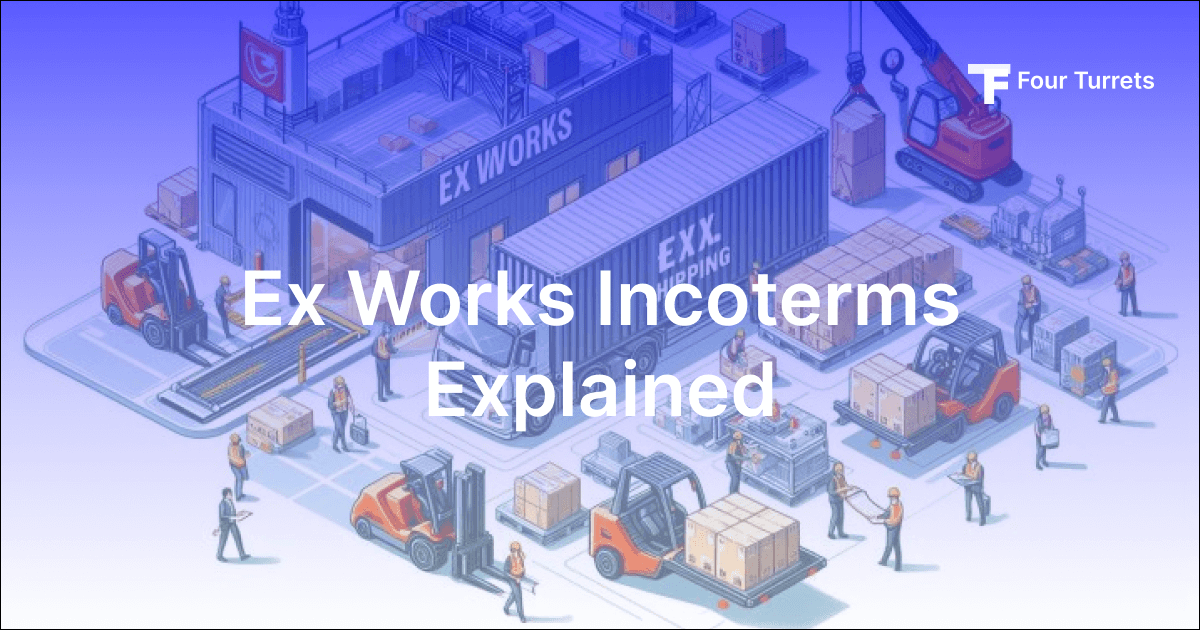The trade between countries provide businesses across the globe the opportunity to grow their market. With good relationships between countries, smoother supply chain transactions also open up. Well, to make trade simple and legally easy to understand, INCOTERMS by International Chamber of Commerce are used.
One such incoterm Ex Works (EXW), which defines the responsibility of the buyer and seller during the shipment process is also commonly used in the shipping process. This blog would explain what Ex Works means, provide examples, and outline the responsibility of each party, while comparing it with one common Incoterms rules – Free on Board (FOB).
What is Ex Works (EXW)?
Ex Works (EXW) is a widely used Incoterm for international trade. Under Ex Works agreement, the supplier makes the goods available at their premises or another named place (a factory, a warehouse, etc.) for the buyer to collect. In this term, the seller’s responsibility ends once the goods are made available for pickup. The buyer must collect the goods and arrange transportation to drop the goods at the final destination.
The entire cycle of export clearance, transportation costs, managing loading & unloading, managing transportation for the place of delivery comes under the buyer’s responsibility.
Example of Ex Works
Imagine a manufacturer in Japan selling machinery to a buyer in United States. The seller produces the machinery and places it at their factory in Japan, ready for pickup. According to the EXW terms, the buyer is responsible for:
- Arranging transport from the seller’s factory to the port.
- Handling all export procedures and documentation with appropriate export licenses.
- Paying for freight and insurance during transit.
- Managing customs clearance upon arrival in United States.
In this example, the seller’s responsibility is limited to making the machinery available at their location.
To use Ex Work term as shipping terms, the seller will mention “Ex Works City Name” on their documents. For instance, a factory in Munich working on Ex Works will mention “Ex Works Munich, Germany” on their invoice and documents.
According to EXW Incoterms, what is each party responsible for?
When using Ex Work Incoterms in international commercial terms, here is who is who bears the risk and responsibility for what.
- Seller’s Responsibilities:
- Make the product available at a selected location for pickup.
- Provide commercial invoice and any other required documents for ease of shipping.
- No obligation (or optional) to load and transporting goods onto the vehicle or clear them for export.
- Buyer’s Responsibilities:
- Arrange for and pay for transportation from the seller’s location.
- Handle all export documentation and customs clearance.
- Assume all risks and costs associated with the goods from the supplier’s premises onwards.
Difference Between Ex Works and FOB Incoterms
While both Ex Works (EXW) and Free on Board (FOB) are Incoterms that define seller-buyer responsibilities, they differ significantly in terms of risk transfer and obligations:
- Risk Transfer:
- Under EXW, the risk transfers to the buyer as soon as the goods are made available at the seller’s location.
- In FOB, the seller retains responsibility until the goods are loaded onto the vessel at the port of shipment.
- Seller’s Role:
- With EXW, the seller has minimal obligations, primarily limited to making the goods available.
- Under FOB, the seller is responsible for loading the goods onto the ship and clearing them for export.
- Buyer’s Role:
- The buyer under EXW must handle all transportation and customs processes from the seller’s premises.
- In FOB, the buyer takes over once the goods are on board the vessel, making their responsibilities slightly less extensive at the outset.
Comparison Table:
| Incoterm | Risk Transfer | Seller’s Role | Buyer’s Role |
|---|---|---|---|
| EXW | At seller’s premises | Minimal obligations | Handles all logistics from pickup |
| FOB | Once goods are loaded on vessel | Responsible until goods are loaded | Assumes responsibility after loading |
By understanding these distinctions, businesses can better navigate their shipping arrangements and responsibilities in international trade.







